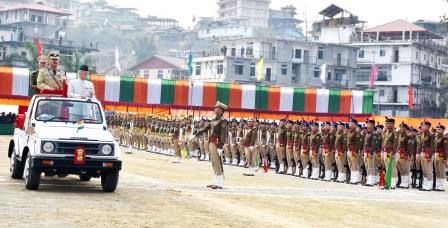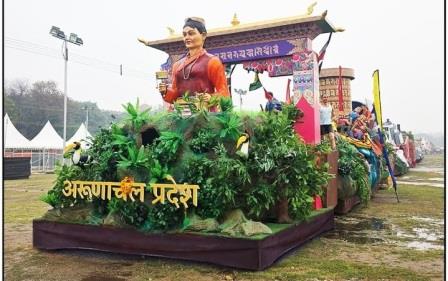-
 Arunachal celebrates 77th Republic Day with fervour
Arunachal celebrates 77th Republic Day with fervour
-
‘Local Food Contest’ marks National Tourism Day
-
AFTF reiterates scrapping of 80:20 recruitment ratio in Arunachal Pradesh
-
Governor, First Lady host ‘At Home’ reception
-
Papum Pare DA holds interaction with newly elected ZPMs
-
Indian Army conducts ‘Know Your Army’ campaign
-
 Arunachal tableau on R-Day spotlights state’s emergence as Adventure Capital…
Arunachal tableau on R-Day spotlights state’s emergence as Adventure Capital…
-
Etalin marks National Voters’ Day, encourages youth participation in democracy
-
Sona reviews PMGSY, VVP projects in Itanagar Circle
-
Lok Bhavan celebrates UP Diwas
Arunachal Pradesh has secured third rank for the best performance in Revised National Tuberculosis Control Programme (RNTCP) during 2017-18. Andhra Pradesh tops the list while Gujarat ranked second. The award was bestowed by the Union Minister for Health and Family Welfare J P Nadda at the fifth national summit on good, replicable practices and innovations in public healthcare systems at Kaziranga in Assam last Tuesday. So be it. However, there is nothing much to gloat over for the state as the incidence of tuberculosis in the state is highest among all states in the North East and almost three times the national average. As per data available, Arunachal has a tuberculosis spread of 1270 per lakh population after Nagaland and Meghalaya (1654 and 1459 respectively). But when it comes to medically treated TB, the data shows Arunachal has 1115 whereas Nagaland and Meghalaya overtook the state (1078 and 648 per lakh population respectively). TB also causes seven per cent of deaths in the state, says the data available.
This is where the state’s performance to reach out to all TB patients has miserably failed. This may be due to remoteness of areas where medical treatment could not be reached out since RNTCP is a continuous process and medical professionals are always in constant touch with the infected with a multi-drug regimen therapy. There is no denying the fact that accessibility to the patients is one of the most important aspects in TB care. Due to the poor infrastructure facilities and remoteness of areas, health workers find it difficult to keep in touch with the infected.
Moreover, addressing health inequities necessitates multi-sector co-ordination which will make sustained TB control efforts involving pro-poor approaches with a resulting decline in TB prevalence. This is possible only when intensified efforts sustained by the RNTCP are augmented with coordinated and synergized efforts of concerned departments across diverse sectors dealing with populations that are considered to be poor. The State Government’s Sarkar Aapke Dwar programme can be one of such approaches but first of all it needs fool-proof data of patients and their locations.

Kenter Joya Riba
(Managing Editor)She is a graduate in Science with post graduation in Sociology from University of Pune. She has been in the media industry for nearly a decade. Before turning to print business, she has been associated with radio and television.
Email: kenterjoyaz@easternsentinel.in / editoreasternsentinel@gmail.com
Phone: 0360-2212313

